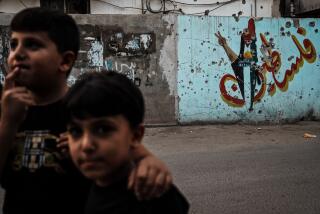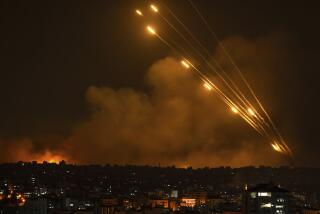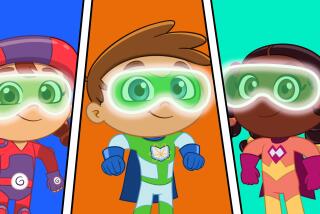‘Kids Ask About War’ Deals With the ‘Fear Out There’ : Television: The PBS special focuses on how children are coping with the blitz of information on the Mideast conflict.
- Share via
“Are there kids who live there?”
The child, interviewed as part of an upcoming public television special on the Persian Gulf war, wanted to know.
“Why are we fighting? Will we be bombed?” Despite the firestorm of reporting about the war, television is just beginning to struggle with the effects that the blitz of information might have on children.
The Public Broadcasting Service is preparing a half-hour special, “Kids Ask About War,” to provide children with answers to the questions that bother them the most.
The program, which is being produced by public station KTCA in Minneapolis, will be fed to PBS stations Sunday morning and will appear on most stations at various times that day. The program, which has not yet been completed, features a studio audience of 15 children, ages 9 through 12, a host and a panel of adult experts.
Producer Tom Lindner says he has asked actress Phylicia Rashad of NBC’s “The Cosby Show” to host the program. She has yet to confirm her participation.
The panel will consist of a child psychologist, a retired Air Force general and a teacher of international studies from the Minneapolis public schools.
Crews from the station spent Wednesday doing interviews in local schools, asking children what their major questions were about war. Those children will not be in the studio audience, Lindner said, but their videotaped questions will be presented to the panel.
“There is a lot of fear out there,” Lindner said. “It’s not only among kids, but kids are what we’ll focus on.”
KCET Channel 28 plans to run the program but has not yet decided on a time slot, spokeswoman Laurel Lambert said. Officials at KOCE Channel 50 in Huntington Beach are juggling their schedule to accommodate more special Persian Gulf-related programming from PBS, but they haven’t decided on air times or dates yet, spokeswoman Judy Schaefer said Thursday.
In addition to “Kids Ask About War,” Lambert said, the station will preempt regular daytime programming throughout the duration of the crisis and run children’s shows until 3 p.m. each day.
Special public service announcements for children and parents prepared by children’s programmer Fred Rogers will appear before and after each show, Lambert said, and the station will broadcast an extra edition of Sesame Street every afternoon.
Rogers, who on Tuesday sent stations two 60-second spots about children and war, has prepared two more, according to his company, Family Communications Inc. in Pittsburgh, Pa.
“In a time of worldwide stress, it’s easy to give in to feeling helpless,” Rogers says in one of the new spots. “Even though we can’t make a difference in the Persian Gulf, we can make a difference in our homes. We can take care of our children by sticking to our normal routines and by respecting our children enough to listen to what they’re telling us.”
Rogers appeared on ABC’s “Good Morning America” program Wednesday, talking about alleviating children’s fears of war. The program also featured an interview with a child psychiatrist and a visit to a school, where children asked questions and expressed their fears.
“A lot of our audience has children, and they would be interested in knowing how to handle this situation,” said “Good Morning America” spokeswoman Cathy Rehl. “It’s a difficult situation for many parents.”
However, viewers in many cities were unable to see the segment because local stations broke in with war reports.
At PBS, producer Lindner said those working on “Kids Ask About War” are struggling with questions of their own, including how specific they should be in offering information about war to children.
“We’re going to have maps,” Lindner said, “and at least one gas mask, so that when the subject of chemical warfare comes up, they can hold a gas mask in their hands. We debated whether to do it, because we didn’t want to shock the kids, but the psychologist tells us that dealing frankly with questions like that goes a long way toward dealing with some of the fears of children.”
More to Read
The complete guide to home viewing
Get Screen Gab for everything about the TV shows and streaming movies everyone’s talking about.
You may occasionally receive promotional content from the Los Angeles Times.






